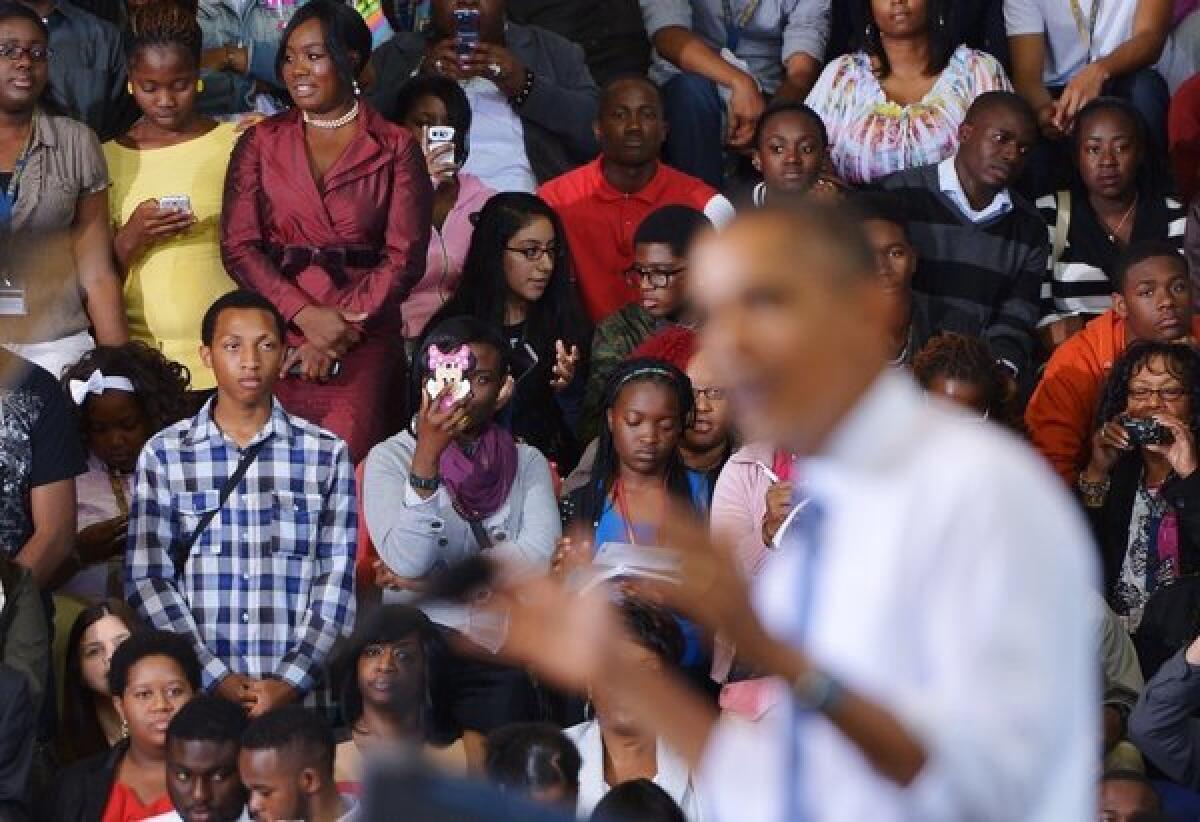Obamacare: Don’t trust anyone over 60?

- Share via
The Republicans’ obsession with Obamacare has been variously described as a tactical ploy to preserve the semblance of unity in a divided party or as a fundraising magnet to raise money from the sort of folks who think President Obama is a reincarnation of Lenin. It may be either (or both). But the idea of closing down the government, and even threatening to precipitate a global credit crisis, over the healthcare law has been widely written off as myopia on the part of the live-free-or-die crowd.
We’re not so sure. Focusing on Obamacare in general, and mandatory coverage in particular, could prove a plausible strategy for broadening the anti-Obama coalition to include voters in their 20s and 30s by bringing attention to what economists call the “cross-subsidy” inherent in any insurance system based on mandatory coverage. And, with hindsight, it may yet be seen as the opening salvo in a generational war, one fed by the reality that older Americans are a rapidly growing burden on younger workers, who can ill afford it.
As everybody with a pulse must know by now, if the only folks who buy Obamacare coverage are the sick and those in late middle age, the system will be self-supporting only at very high premiums, hardly a recipe for cementing popular support. That’s why candidate Obama reluctantly accepted the individual mandate as part of his health insurance plan, adding a spoonful of sugar for those who are poorly paid (but Medicaid ineligible) in the form of need-based subsidies. Indeed, as pundit Matt Miller has pointed out, such generational transfers are the keystone to virtually all health insurance: Employer-based group insurance works only because younger workers help carry older ones.
There are powerful economic arguments in favor of universal coverage. For one thing, it solves the “free-riding” problem. Because we collectively assume responsibility for the uninsured when they end up in the hospital anyway, why not ask them to take some responsibility before the fact? Equally to the point, mandatory coverage would probably cut the country’s total medical bill, reducing the financial incentive for an individual to delay treatment until a garden-variety illness morphs into a case for the ICU.
That said, it is still foolish to ignore the leverage that the individual mandate gives opponents of Obamacare. America’s healthcare system for the elderly (Medicare, plus Medicaid for nursing-home care) is already edging the country toward generational war because Washington will sooner or later be forced to choose between drastic limitations on coverage in those programs or drastic increases in taxes on the decreasing portion of working Americans. Now we’re adding a parallel obligation on younger workers to subsidize healthcare for fiftysomethings.
What to do? The path of least political resistance is to tough it out, hoping younger households will be unable to figure out what’s happening, or simply unwilling to throw in their lot with opponents of gay marriage, marijuana reform and the like. Alternatively, we could start paying attention to the building crisis as younger households scramble ever harder for a middle-class living standard.
And none too soon, because the signs of generational conflict are already appearing. Think, for example, of the flare in anger over the burden of college loans. Or the popular resentment of government employees who (at least until recently) could count on job stability, adequate health insurance and even pensions.
Those of us who are doing very well in a system that isn’t working very well for the majority would be wise to do something about it before the doo-doo hits the fan. Then again, in light of what’s been happening in Washington lately, maybe it’s already too late.
Robert Hahn is director of economics at the Smith School, University of Oxford, and a senior fellow at the Georgetown Center for Business and Public Policy. Peter Passell is a senior fellow at the Milken Institute, a Santa Monica-based think tank, and editor of the Milken Institute Review.
More to Read
A cure for the common opinion
Get thought-provoking perspectives with our weekly newsletter.
You may occasionally receive promotional content from the Los Angeles Times.










